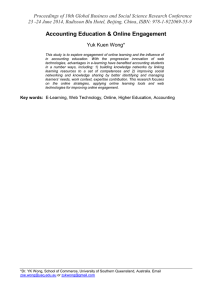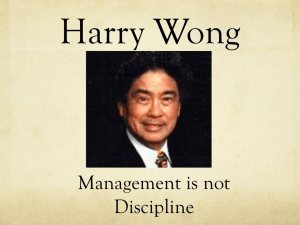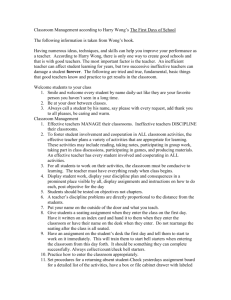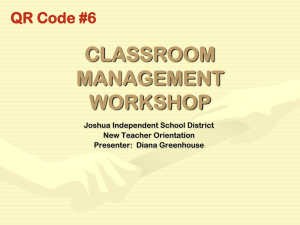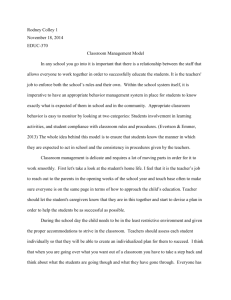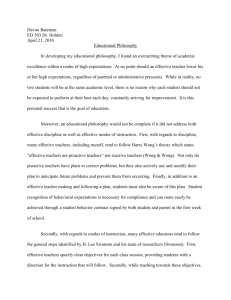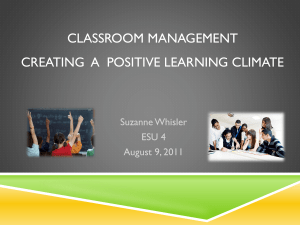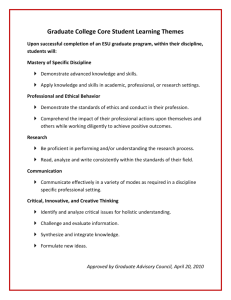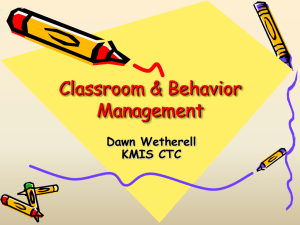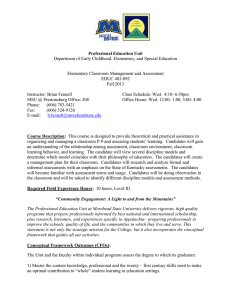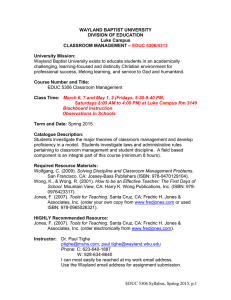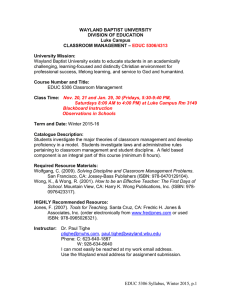Brochure on the book - Early Learning Community
advertisement
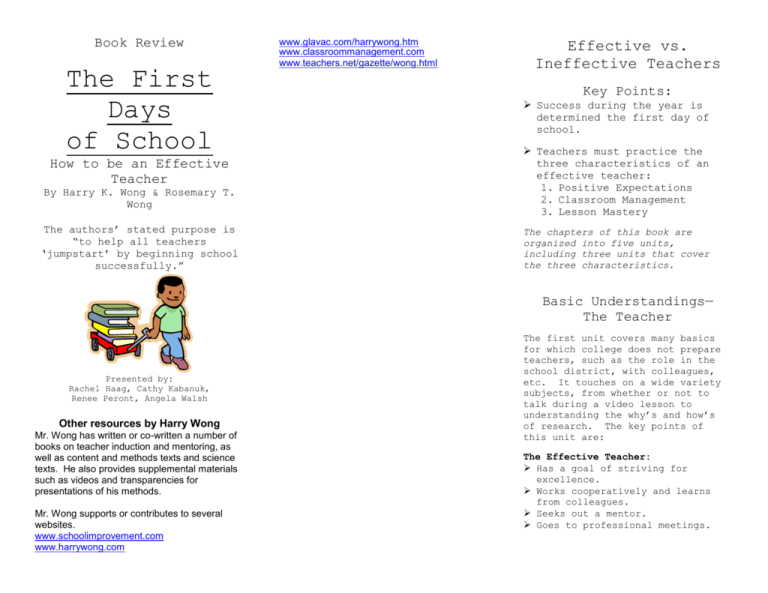
Book Review The First Days of School How to be an Effective Teacher By Harry K. Wong & Rosemary T. Wong The authors’ stated purpose is “to help all teachers ‘jumpstart’ by beginning school successfully.” www.glavac.com/harrywong.htm www.classroommanagement.com www.teachers.net/gazette/wong.html Effective vs. Ineffective Teachers Key Points: Success during the year is determined the first day of school. Teachers must practice the three characteristics of an effective teacher: 1. Positive Expectations 2. Classroom Management 3. Lesson Mastery The chapters of this book are organized into five units, including three units that cover the three characteristics. Basic Understandings— The Teacher Presented by: Rachel Haag, Cathy Kabanuk, Renee Peront, Angela Walsh Other resources by Harry Wong Mr. Wong has written or co-written a number of books on teacher induction and mentoring, as well as content and methods texts and science texts. He also provides supplemental materials such as videos and transparencies for presentations of his methods. Mr. Wong supports or contributes to several websites. www.schoolimprovement.com www.harrywong.com The first unit covers many basics for which college does not prepare teachers, such as the role in the school district, with colleagues, etc. It touches on a wide variety subjects, from whether or not to talk during a video lesson to understanding the why’s and how’s of research. The key points of this unit are: The Effective Teacher: Has a goal of striving for excellence. Works cooperatively and learns from colleagues. Seeks out a mentor. Goes to professional meetings. Positive Expectations According to research success is not due to background or accomplished, but rather, success is related directly to attitude. Positive expectations lead to success. Thus, we must start the year with the belief that we will have a successful year, and that all of our students can and will learn. The authors discuss “Invitational Education,” the goal of which is to invite your students to learn. Personal skills such as smiling, addressing people by name and respectful language cultivate a positive classroom climate. The chapter also includes practical advice such as how to get more parents to come to open house. Key points of this unit are: The Effective Teacher: Has a personal goal of high expectations. Has a statement of positive expectations ready for the first day of school. Dresses for success to model success, respect, credibility, acceptance, and authority. Teacher dress affects student work, attitude and discipline. Creates a classroom climate that communicates positive expectations. o Make the first day of school a celebration. o Greet students at the bus stop on the first day of school. Classroom Management “The effective teacher is an extremely good classroom manager.” The first day of school is the most important day of the year in terms of managing the classroom for the rest of the year. It determines how much gets accomplished during the day, and it prevents discipline problems. Research indicates that the most important factor to enhance student learning is a wellmanaged classroom. Classroom management includes all aspects of organization in the classroom: students, time, space, and materials. This unit offers extensive, practical advice on such aspects of management as seating arrangements and assignments, taking roll, maintain a grade book. Some of the general guidelines are: Design your classroom for work. Maximize your proximity to the students and to the materials. Introduce yourself to parents and students before school starts. Greet students at the door with a handshake and a smile. Post daily schedule each day. Post all assignments, every day. Do not start immediately with roll, start with a lesson, and have a procedure for roll. This unit also discusses how to have an effective discipline plan. It differentiates between rules and procedures. Effective Discipline Plan: Maximize student learning to minimize student misbehavior. Do not get caught in arguments – practice saying, “Because you CHOSE to break the rule….” Rules or responsibilities: maximum of 3-5. o Flexible o Rewards & penalties Reasonable and logical consequences Do not stop instruction when giving out the consequence (check by name on the board…) Procedures: In contrast to keeping rules to a minimum, you will have procedures for essentially everything, and this chapter features concrete ideas, as well as methods for teaching them. Much of the first week of school is spent teaching procedures. Teach procedures and routines so that students are selfdisciplined. o Explain o Rehearse o Reinforce Lesson Mastery “The effective teacher knows how to design lessons to help students reach mastery.” The book supports a direct instruction method: explain and demonstrate. It barely touches on creating an effective lesson, focusing instead on creating an effective assignment. It explains how and when to write objectives, and has sections on how to get kids to pass their tests, and how to get them to work cooperatively. “If the student cannot demonstrate learning or achievement, the student has not failed—WE have failed the student.” Key Points: Rather than asking, “What am I going to cover tomorrow?” ask, “What are my students going to learn and accomplish tomorrow?” Have assignment posted on the board when students enter the room. Effective teachers can define three key concepts: 1. Learning 2. Comprehension 3. Mastery Our Ratings Pros Easy to read; well-organized layout. Anecdotes, verses, cartoons, photos, text boxes make it more readable. Good advice about starting the year well-prepared. Has some good ideas. Cons Simplistic at times, too specific in areas. Has some poor suggestions, particularly in the discipline section. More on developing good assignments than developing good lessons. We suggest that you save your money and check this book out from the library. While it had some good ideas, we felt like everyone in our program is better prepared than this book apparently expects.
